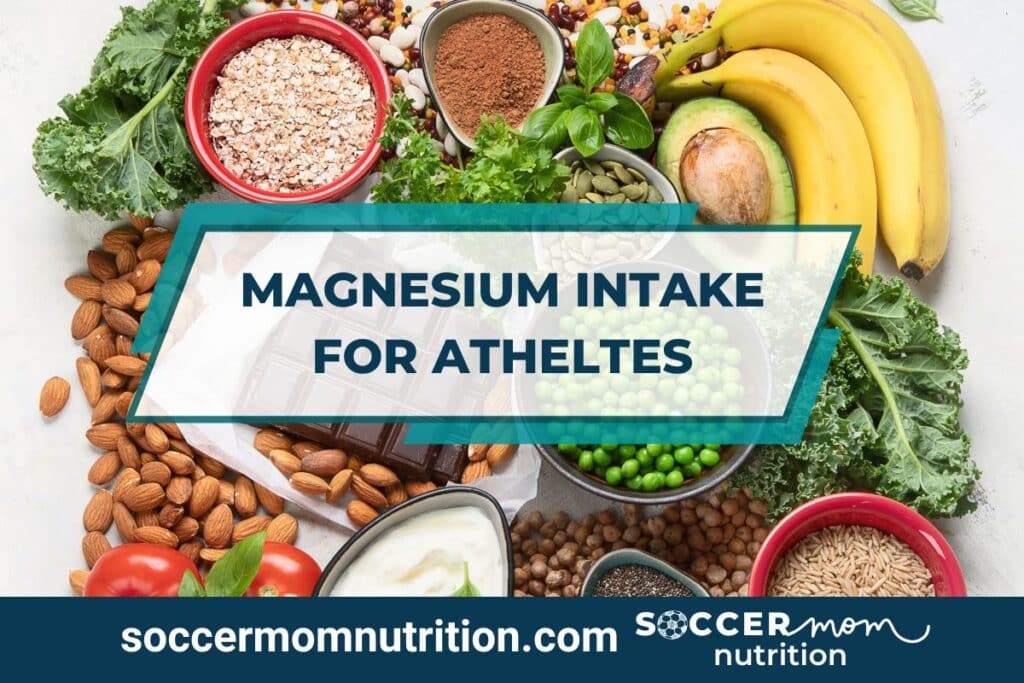Magnesium Intake for Athletes: Benefits and Food Sources
Magnesium intake for athletes is especially important because it can affect how well you perform, recover and stay healthy.
Your body needs magnesium, a mineral, for many functions, such as making energy, moving your muscles, heart rhythm, sending signals to your nerves and keeping your bones strong.
In this post, we will explain why magnesium is good for athletes, how much they need and the best food sources.

Benefits of magnesium intake for athletes
Magnesium is involved in more than 300 metabolic reactions in your body. These processes include energy production, protein synthesis, heart rhythm, blood glucose levels and nerve function.
Magnesium intake for athletes is essential for many body functions and not getting enough can impact performance and health.
Getting enough magnesium intake can help athletes in many ways, such as:
1. Boosting your exercise efficiency and endurance
Magnesium helps your cells make and use energy. It also helps carry oxygen to your muscles and is an electrolyte to help balance the minerals in your body. Having enough magnesium can help you use your energy better and avoid getting tired.
2. Increasing your muscle strength and power
Magnesium is needed for your muscles to contract and relax. It also affects how your muscles respond to electrical signals and how much force they can produce.
Studies have shown that taking magnesium can improve your muscle strength and power.
3. Reducing your muscle damage and inflammation
Magnesium protect your muscles from the stress and inflammation caused by exercise. Having enough magnesium can also help your muscles heal and grow.
By lowering your muscle damage and inflammation, magnesium can speed up your muscle recovery and prevent injuries.
4. Preventing muscle cramps and spasms
Magnesium is an electrolyte that helps regulate the balance of minerals and fluids in your body, which can affect how your muscles contract.
Low magnesium levels can cause muscle cramps and spasms, which can be painful and interfere with your performance. Some studies have shown a benefit in taking magnesium to reduce muscle cramps and spasms in athletes .
These are some of the benefits of magnesium for athletes. As you can see, magnesium is essential for your athletic performance, recovery and health. But how much magnesium do you need, and where can you get it?
Food sources for magnesium intake for athletes
The best way to get enough magnesium for your athletic needs is to eat a balanced diet that includes a variety of foods rich in magnesium. Some of the best magnesium rich food sources are:
Green leafy vegetables
Green leafy vegetables such as spinach, kale, Swiss chard and collard greens. These vegetables are also high in other nutrients, such as iron, calcium and vitamin K, that are beneficial for your health and performance.
Nuts and seeds
Nuts and seeds such as almonds, cashews, pistachios, pumpkin seeds and sunflower seeds. These foods are also high in healthy fats, protein and fiber, that can help you feel full and energized.
Whole grains
Whole grain cereals such as oats, quinoa, brown rice and buckwheat. These foods are also high in complex carbohydrates, which are the main fuel source for your muscles during exercise.
Legumes
Legumes such as beans, lentils, chickpeas and soybeans. These foods are also high in protein, which is essential for your muscle growth and repair.
Dark chocolate
Dark chocolate which is not only delicious, but also rich in magnesium, antioxidants and flavonoids, which can improve your blood flow and mood.

These are some of the food sources of magnesium for athletes. You can also get magnesium from other foods, such as dairy products, eggs, fish, meat and fruits, but in smaller amounts.
You can check the nutrition facts label of packaged foods to see how much magnesium they contain per serving.
| Food | Serving size | Milligrams (mg) |
|---|---|---|
| Pumpkin seeds, roasted | 1 ounce | 156 |
| Quinoa, cooked | 1 cup | 118 |
| Almonds, dry roasted | 1 ounce | 80 |
| Spinach, boiled | 1/2 cup | 78 |
| Cashews, dry roasted | 1 ounce | 74 |
| Peanuts, oil roasted | 1/4 cup | 63 |
| Shredded wheat cereal | 2 large biscuits | 61 |
| Soy milk, plain or vanilla | 1 cup | 61 |
| Black beans, cooked | 1/2 cup | 60 |
| Edamame, shelled, cooked | 1/2 cup | 50 |
| Dark chocolate | 1 ounce | 50 |
| Peanut butter, smooth | 2 tablespoons | 49 |
| Brown rice, cooked | 1/2 cup | 42 |
| Yogurt, plain, low fat | 8 ounces | 42 |
| Avocado, cubed | 1 cup | 44 |
| Oatmeal, instant | 1 packet | 36 |
| Banana, medium | 1 | 32 |
| Salmon, Atlantic, farmed, cooked | 3 ounces | 26 |
| Halibut, cooked | 3 ounces | 24 |
| Milk | 1 cup | 24-27 |
Magnesium requirements for athletes
The recommended dietary allowance (RDA) of magnesium for adults is 310-420 mg per day, depending on your gender and age.
However, athletes may need more magnesium than the general population, as they lose more magnesium through sweat and urine during exercise.
But, there is no consensus on the optimal magnesium intake for athletes, and more research is needed to determine the best dosage
Over 60% of the general adult population does not meet the RDA for magnesium. In addition, several studies have found that athletes do not consume enough magnesium, putting their performance and health at risk.
| Age Group | Male | Female |
| 10-13 years | 240 mg | 240 mg |
| 14-18 years | 410 mg | 360 mg |
| 19-30 years | 400 mg | 310 mg |
| 31-50 years | 420 mg | 320 mg |
| 51+ years | 420 mg | 320 mg |
It is important to note that taking too much magnesium can cause side effects, such as diarrhea, nausea, vomiting and low blood pressure.
Therefore, you should not exceed the tolerable upper intake level (UL) of magnesium, which is 350 mg per day from supplements.
And if you do take decide to take a supplement, you should consult with your doctor or a sports registered dietitian nutritionist.
You can get more magnesium from food sources without any risk of toxicity, as your body can regulate the absorption and excretion of magnesium from food
Final thoughts
Magnesium is the fourth most abundant mineral that can help you improve your athletic performance, recovery and health.
It can boost your exercise efficiency and endurance, increase your muscle strength and power, reduce your muscle damage and inflammation, and prevent muscle cramps and spasms.
To get enough magnesium for your athletic needs, you should eat a balanced diet that includes a variety of foods rich in magnesium, such as green leafy vegetables, nuts and seeds, whole grains, legumes and dark chocolate.
By following these tips, you can optimize your dietary magnesium intake and enjoy the benefits of this mineral for your sports performance, recovery and health.
Join our mailing list and get our FREE Pre-Activity Fueling Guide.
Stephanie Magill, MS, RD, CD, FAND has over 22 years of experience in public health and nutrition. As a performance registered dietitian nutritionist, Stephanie specializes in sports nutrition and provides simple and actionable information so that athletes can be well fueled for high performance on and off the field. Stephanie has a Master’s Degree in Nutrition and is a Fellow of the Academy of Nutrition and Dietetics.

